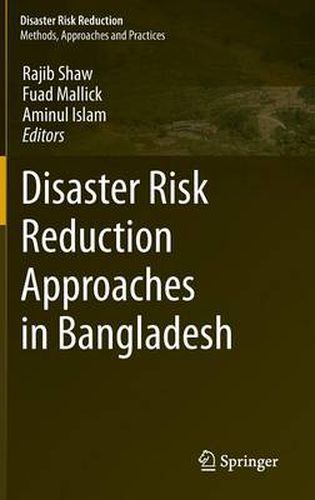Readings Newsletter
Become a Readings Member to make your shopping experience even easier.
Sign in or sign up for free!
You’re not far away from qualifying for FREE standard shipping within Australia
You’ve qualified for FREE standard shipping within Australia
The cart is loading…






This title is printed to order. This book may have been self-published. If so, we cannot guarantee the quality of the content. In the main most books will have gone through the editing process however some may not. We therefore suggest that you be aware of this before ordering this book. If in doubt check either the author or publisher’s details as we are unable to accept any returns unless they are faulty. Please contact us if you have any questions.
This book outlines disaster risk reduction (DRR) approaches in Bangladesh, drawing examples and lessons from the national and community-level programs, projects, and relevant experiences of the country. The content is based on a selection of available documents, a consultative workshop with academicians from different universities undertaking DRR higher education programs, and the editors’ own knowledge and experience in the field. Special emphasis is given to analyzing field experiences from academic perspectives, and to highlighting key issues and the policy relevance of disaster risk reduction.
The book has three parts: Part I provides the outline and basics of DRR, with examples from a global review and from national policies and priorities. Part II covers seven different hazards in Bangladesh, focusing on both shocks and stresses. Part III provides examples of approaches and issues of DRR practices.
The primary target groups for this book are students and researchers in the fields of environment, disaster risk reduction, and climate change studies. The book will provide them with a good idea of the current trend of research in the field and will furnish basic knowledge on this important topic in Bangladesh. Another target group comprises practitioners and policy makers, who will be able to apply collective knowledge to policy and decision making.
$9.00 standard shipping within Australia
FREE standard shipping within Australia for orders over $100.00
Express & International shipping calculated at checkout
This title is printed to order. This book may have been self-published. If so, we cannot guarantee the quality of the content. In the main most books will have gone through the editing process however some may not. We therefore suggest that you be aware of this before ordering this book. If in doubt check either the author or publisher’s details as we are unable to accept any returns unless they are faulty. Please contact us if you have any questions.
This book outlines disaster risk reduction (DRR) approaches in Bangladesh, drawing examples and lessons from the national and community-level programs, projects, and relevant experiences of the country. The content is based on a selection of available documents, a consultative workshop with academicians from different universities undertaking DRR higher education programs, and the editors’ own knowledge and experience in the field. Special emphasis is given to analyzing field experiences from academic perspectives, and to highlighting key issues and the policy relevance of disaster risk reduction.
The book has three parts: Part I provides the outline and basics of DRR, with examples from a global review and from national policies and priorities. Part II covers seven different hazards in Bangladesh, focusing on both shocks and stresses. Part III provides examples of approaches and issues of DRR practices.
The primary target groups for this book are students and researchers in the fields of environment, disaster risk reduction, and climate change studies. The book will provide them with a good idea of the current trend of research in the field and will furnish basic knowledge on this important topic in Bangladesh. Another target group comprises practitioners and policy makers, who will be able to apply collective knowledge to policy and decision making.